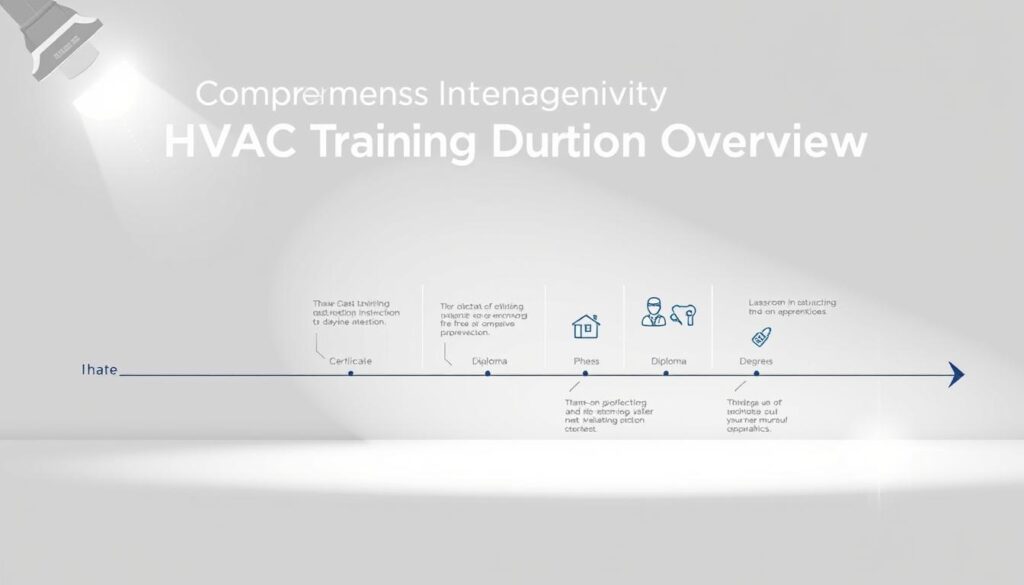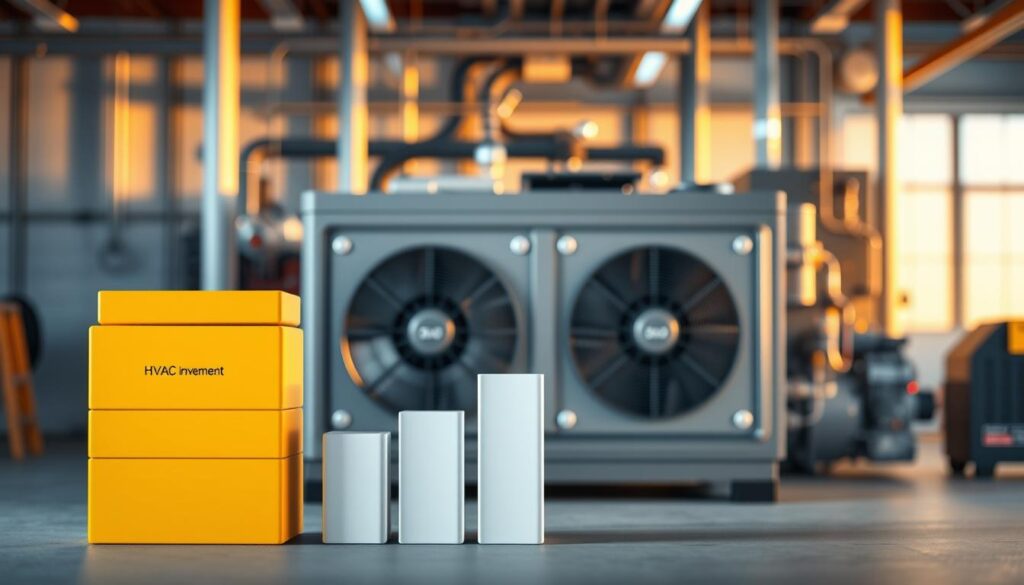Affiliate Disclosure
HVAC Guide Guys is a participant in the Amazon Services LLC Associates Program, an affiliate advertising program designed to provide a means for sites to earn advertising fees by advertising and linking to Amazon.
How Many Years Is HVAC Training? Ever thought about how long it takes to become a skilled HVAC technician? This career involves heating, ventilation, and air conditioning systems. It’s a journey with many paths and exciting chances.

HVAC training has different options, from short certificates to full degree programs. The time it takes to complete HVAC training varies. It depends on your goals and what you want to learn.
Knowing about HVAC systems and how to keep them running is key. This guide will help you understand HVAC training. It’s here to guide you in choosing your career path.
Key Takeaways
- HVAC training programs range from 3 months to 2 years
- Multiple educational pathways exist for aspiring technicians
- Certification and apprenticeship are critical components of training
- Career opportunities expand with advanced education
- Practical skills are as important as theoretical knowledge
Table of Contents
Understanding HVAC Training Fundamentals
HVAC technicians keep places comfortable and efficient. They work in homes and businesses. Your journey starts with learning the basics of HVAC skills.
HVAC is complex and needs deep technical knowledge. HVAC pros must know a lot about heating, ventilation, and air conditioning. They work to keep systems running well and replace them when needed.
The Role of HVAC Technicians
HVAC technicians do many important jobs. They include:
- Installing complex heating and cooling systems
- Performing routine maintenance
- Diagnosing and repairing equipment malfunctions
- Ensuring energy efficiency
Core Components of HVAC Systems
Knowing the main parts of HVAC systems is key. These parts are:
- Heating units
- Cooling systems
- Ventilation equipment
- Refrigeration mechanisms
Basic Skills Requirements
Good HVAC pros have technical and people skills. Mechanical aptitude is important. They also need:
- Problem-solving skills
- Strong customer service skills
- Ability to read technical diagrams
- Physical stamina for hands-on work
Mastering HVAC systems requires continuous learning and adaptability in a rapidly evolving technological landscape.
Explore Our HVAC Shop
Looking for top-rated HVAC tools, parts, and accessories? Visit our shop and find the perfect solution for your needs.
Visit the ShopHow Many Years Is HVAC Training Programs
Knowing how long HVAC training takes is key to planning your career. HVAC programs come in various lengths to fit your goals and schedule. You can finish training in 6 months or spend up to 4 years on a full course.
Training times usually fall into three main groups:
- Short-term Certificate Programs: 6-12 months
- Associate Degree Programs: 2 years
- Bachelor’s Degree Programs: 4 years
Each program level affects your knowledge of HVAC equipment and career chances. Short-term certificates teach basic skills fast. Advanced degrees give deeper technical knowledge and lead to management roles.
When choosing your training, think about your career goals. New technicians might start with certificates. Those aiming for higher roles might choose longer programs. Your choice should match your career dreams and the job market.
Pro Tip: Continuous learning remains key in HVAC, no matter the initial training length.
The cost of HVAC training depends on the program’s length and where you study. Community colleges and tech schools are often cheaper than four-year colleges. Look into local schools to find one that fits your budget and career plans.
Explore Our HVAC Shop
Looking for top-rated HVAC tools, parts, and accessories? Visit our shop and find the perfect solution for your needs.
Visit the ShopTypes of HVAC Educational Pathways
Choosing the right educational pathway is key for those wanting to become HVAC technicians. Each program has its own benefits that can shape your future career. They help you understand how to maintain and improve HVAC systems.
There are several ways to start your HVAC career. Each path is designed to prepare you for success in heating, ventilation, and air conditioning.
Certificate Programs: Quick Entry to HVAC Career
Certificate programs are great for those who want to start quickly. They last 3-6 months and focus on the basics of HVAC.
- Rapid completion time (3-6 months)
- Concentrated technical training
- Lower cost compared to longer programs
- Basic understanding of HVAC system maintenance
Diploma Programs: Comprehensive Technical Training
Diploma programs dive deeper into HVAC systems. They teach you about design, installation, and maintenance.
- One-year intensive training
- Hands-on practical experience
- Advanced troubleshooting techniques
- Deeper insights into hvac maintenance strategies
Associate Degrees: Advanced Professional Preparation
An associate degree is the most detailed HVAC program. It lasts two years and includes both technical and general education.
- Two-year extensive curriculum
- In-depth understanding of factors affecting hvac lifespan
- General education requirements
- Enhanced career advancement opportunities
Choosing the right educational pathway is essential. It sets the stage for a fulfilling HVAC career.
HVAC Certification Requirements and Timeline
Understanding HVAC certifications is key for those aiming to keep HVAC systems running well. The Environmental Protection Agency (EPA) requires specific certifications for technicians. These are vital for your career growth.
The EPA Section 608 Certification is a must for all HVAC techs. It comes in four levels:
- Type I: Small appliances refrigeration
- Type II: High-pressure refrigeration systems
- Type III: Low-pressure refrigeration systems
- Universal: Covers all refrigeration types
Professional groups also offer extra certifications. The North American Technician Excellence (NATE) certification shows off your advanced skills. It proves you can handle tough system problems and find ways to make systems last longer.
Getting certified takes time. It usually involves:
- Finishing required training
- Passing tough exams
- Keeping your certification up to date with ongoing education
Certifications need to be renewed every 1-3 years. This keeps techs up-to-date with new tech and best practices.
Professional certifications are not just credentials—they’re your passport to a successful HVAC career.
Explore Our HVAC Shop
Looking for top-rated HVAC tools, parts, and accessories? Visit our shop and find the perfect solution for your needs.
Visit the ShopHVAC Apprenticeship Duration and Structure
HVAC apprenticeships are a great way to become a skilled technician. They mix hands-on skills with book learning. This gives you a strong base for your HVAC career.
Starting your HVAC training journey often means joining an apprenticeship program. These programs turn newbies into pros through deep learning.
Paid Apprenticeship Programs
Paid apprenticeships offer big benefits for those starting in HVAC:
- Earn good money while you learn
- Get real-world experience
- Work with seasoned pros
- Learn key maintenance skills
On-the-Job Training Components
Your apprenticeship will focus on learning by doing in key areas:
- Learning how to install systems
- Understanding equipment diagnostics
- Knowing how to repair and maintain systems
- Learning about safety
Classroom Instruction Requirements
Classroom learning adds to your practical skills. You’ll study:
- Advanced system design
- Electrical theory
- Refrigeration basics
- Industry rules
Apprenticeships usually last 3-5 years. They give you a full training for HVAC careers.
Cost and Investment Considerations

Choosing to invest in HVAC training is a big decision. It affects your future career. The costs vary, from affordable certificate programs to more detailed associate degrees. Knowing the costs helps you plan your education better.
When you think about HVAC training costs, consider a few things:
- Tuition fees for educational programs
- Required textbooks and study materials
- Specialized tools and equipment
- Certification exam registration costs
- Protective work gear
But there’s more to think about than just the initial costs. Good HVAC education helps you understand how to make units last longer. It also helps you know when to replace equipment. This can save your employer a lot of money on repairs and replacements.
There are ways to make your education more affordable:
- Federal student financial aid
- Trade school scholarships
- Employer tuition reimbursement programs
- State-sponsored vocational grants
- Specialized HVAC training loans
Pro tip: Look into local community colleges and technical institutes for affordable HVAC training in your area.
Investing in quality HVAC training is not just an expense. It’s a smart career move with big long-term benefits.
Explore Our HVAC Shop
Looking for top-rated HVAC tools, parts, and accessories? Visit our shop and find the perfect solution for your needs.
Visit the ShopCareer Advancement Opportunities
Being an HVAC pro opens doors to exciting growth and specialization. Knowing how to make HVAC systems last longer can really help your career.
The HVAC world has many paths for those who want to grow and earn more. You can start as a beginner and work your way up to roles that need a lot of technical know-how.
Entry-Level to Master Technician Path
To move up in HVAC, you need to keep learning and working hard. Here’s how you can advance:
- Start as an apprentice technician
- Get field experience
- Get more certifications
- Become a journeyman technician
- Reach master technician status
Specialization Options
You can specialize in certain areas to become an expert in making HVAC systems last longer:
| Specialization Area | Key Focus |
|---|---|
| Commercial Refrigeration | Large-scale cooling systems |
| Energy Efficiency | Sustainable HVAC solutions |
| Green Technology | Environmentally friendly systems |
Management Positions
Your skills can lead to leadership roles like service manager or business owner. These jobs need technical know-how, good communication, and business smarts.
“Continuous learning is the key to success in the HVAC industry.” – HVAC Industry Expert
By keeping up with new HVAC tech and knowing how to extend system life, you can have a fulfilling and profitable HVAC career.
Salary Expectations Through Training Years

Your journey in the HVAC industry offers promising financial rewards. Knowing what you can earn helps you plan your career. The U.S. Bureau of Labor Statistics shows the income growth for HVAC professionals at each stage.
At the start, technicians earn between $30,000 and $40,000 a year. As you gain skills in diagnosing and fixing HVAC systems, your pay will go up.
| Career Stage | Average Annual Salary | Skill Level |
|---|---|---|
| Entry-Level | $30,000 – $40,000 | Basic Technical Skills |
| Mid-Career | $45,000 – $60,000 | Advanced Diagnostics |
| Experienced Technician | $60,000 – $75,000 | Specialized Knowledge |
| Master Technician | $75,000 – $90,000 | Expert-Level Skills |
Several things affect your salary:
- Where you live
- Specialized certifications
- Advanced technical skills
- Knowledge of complex systems
Continuing to learn and improve your skills can greatly increase your earnings. Being able to accurately predict when to replace HVAC systems and spot aging systems makes you very valuable.
“Your skills and expertise are your most significant career assets in the HVAC industry.” – HVAC Industry Expert
By improving your skills and keeping up with new technology, you can build a successful and fulfilling HVAC career.
Conclusion
Looking into HVAC training shows a wide range of options. You can choose from short certificate programs to two-year associate degrees. Each path has its own benefits for your career.
The right choice depends on your goals, how much time you have, and your budget. HVAC training is key to understanding and fixing complex systems. It also helps you keep up with new technologies.
Choosing the right HVAC program is important for your future. Whether it’s a quick certificate or a two-year degree, you’ll gain valuable skills. Look for programs with lots of hands-on training, certifications, and chances to specialize.
Your HVAC training is a step towards a stable and fulfilling career. With hard work, continuous learning, and smart choices, you can start a successful career. HVAC is vital for homes and businesses, making it a promising field.
FAQ
How long does it typically take to complete HVAC training?
What certifications do I need to become an HVAC technician?
How much does HVAC training cost?
How long does it typically take to complete HVAC training?
What certifications do I need to become an HVAC technician?
How much does HVAC training cost?
FAQ
How long does it typically take to complete HVAC training?
The time it takes to finish HVAC training varies. Certificate programs last 6-12 months. Associate degrees take two years, and bachelor’s degrees need four years.
Apprenticeships last 3-5 years. They mix on-the-job training with classroom learning.
What certifications do I need to become an HVAC technician?
You need the EPA Section 608 certification, which has four types. NATE (North American Technician Excellence) or HVAC Excellence certifications also show your skills and help your career.
How much does HVAC training cost?
Prices differ based on the program. Certificate programs cost
FAQ
How long does it typically take to complete HVAC training?
The time it takes to finish HVAC training varies. Certificate programs last 6-12 months. Associate degrees take two years, and bachelor’s degrees need four years.
Apprenticeships last 3-5 years. They mix on-the-job training with classroom learning.
What certifications do I need to become an HVAC technician?
You need the EPA Section 608 certification, which has four types. NATE (North American Technician Excellence) or HVAC Excellence certifications also show your skills and help your career.
How much does HVAC training cost?
Prices differ based on the program. Certificate programs cost $1,000 to $5,000. Associate degrees are $10,000 to $30,000. Apprenticeships might cost little if you’re earning while learning.
Financial aid, scholarships, and grants can help pay for these costs.
What skills do I need to succeed in HVAC?
You need mechanical skills, problem-solving, and customer service. Physical stamina is also key. Knowing about heating, cooling, and ventilation systems is important, along with electrical and electronic systems.
What is the career progression for HVAC technicians?
You start as an entry-level technician. With experience and certifications, you become a journeyman. You can then become a master technician or specialize in areas like commercial refrigeration.
Management roles like service manager or business owner are also possible.
How long do HVAC systems typically last?
HVAC systems usually last 10-15 years. Maintenance, usage, and environment affect this. Regular upkeep can extend your system’s life.
Can I work while completing my HVAC training?
Yes, many programs offer flexible schedules. Evening and weekend classes are common. Apprenticeships are great because you earn while you learn.
What is the average salary for HVAC technicians?
New technicians earn $35,000-$45,000 a year. With more experience and certifications, you can make $50,000-$75,000 or more. Specializing or managing can increase your salary even more.
Is ongoing training necessary in the HVAC field?
Yes, it’s essential! The field changes fast. Staying updated with new tech and regulations is key. Many certifications need renewal and ongoing education.
What are the best educational pathways for HVAC training?
The best path depends on your goals and situation. Certificate programs are quick, associate degrees offer more training, and apprenticeships give hands-on experience. Think about your time, budget, and goals when choosing.
,000 to ,000. Associate degrees are ,000 to ,000. Apprenticeships might cost little if you’re earning while learning.
Financial aid, scholarships, and grants can help pay for these costs.
What skills do I need to succeed in HVAC?
You need mechanical skills, problem-solving, and customer service. Physical stamina is also key. Knowing about heating, cooling, and ventilation systems is important, along with electrical and electronic systems.
What is the career progression for HVAC technicians?
You start as an entry-level technician. With experience and certifications, you become a journeyman. You can then become a master technician or specialize in areas like commercial refrigeration.
Management roles like service manager or business owner are also possible.
How long do HVAC systems typically last?
HVAC systems usually last 10-15 years. Maintenance, usage, and environment affect this. Regular upkeep can extend your system’s life.
Can I work while completing my HVAC training?
Yes, many programs offer flexible schedules. Evening and weekend classes are common. Apprenticeships are great because you earn while you learn.
What is the average salary for HVAC technicians?
New technicians earn ,000-,000 a year. With more experience and certifications, you can make ,000-,000 or more. Specializing or managing can increase your salary even more.
Is ongoing training necessary in the HVAC field?
Yes, it’s essential! The field changes fast. Staying updated with new tech and regulations is key. Many certifications need renewal and ongoing education.
What are the best educational pathways for HVAC training?
The best path depends on your goals and situation. Certificate programs are quick, associate degrees offer more training, and apprenticeships give hands-on experience. Think about your time, budget, and goals when choosing.

